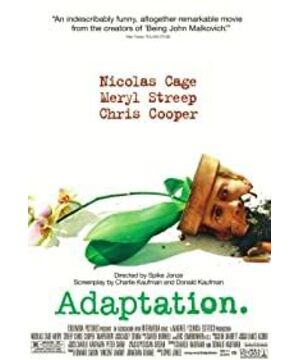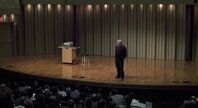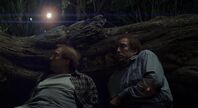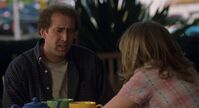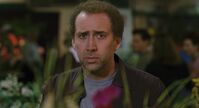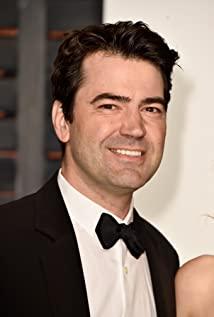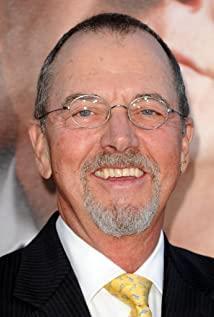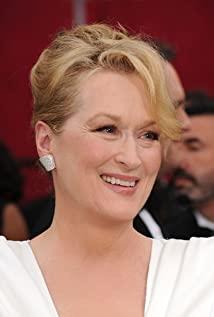Adaptation can refer either to adapting a screenplay or to an adaptation to a cliché. Darwin's theory of evolution is repeatedly emphasized in the film, and the protagonist Charlie also wants to tell a script only about flowers. It seems that the focus of the film is how orchids survive the fittest in nature. But on the contrary, the story of the film has nothing to do with orchids or The Orchid Thief, but the story of how a screenwriter adapted a text into a film.
When it comes to adaptation, it is not unfamiliar in the current development trend of media integration. Manifestation, light modification, and IP modification of online novels are emerging one after another. Ordinary people's focus on adaptation lies in the question of the conformity of text and video. Even though adaptation is gaining momentum today, most adaptations are unsatisfactory. Because the main body of trying to adapt is not to appreciate the text, but to see that the adaptation is profitable, this may cause the adaptation to eventually become a so-called fan work. The book "Orchid Thief" in the film does exist in reality, and Charlie Kaufman in reality is indeed faced with the task of adaptation, but he is not simply based on the original book, but through stories. In this way, the text, film and reality are integrated together, and the original work is used to express the dissatisfaction of the screenwriter.
There are three Charlie Kaufmans in the movie, the first is the real screenwriter Charlie Kaufman, the second is the screenwriter in the movie, Charlie Kaufman played by Cage, and the third is the movie The self in the screenplay written by the screenwriter. It is difficult to find a real turning point in the film, making people convinced that Charlie is no longer the Charlie in the film, but the Charlie written by the screenwriter. But the abruptness of the style before and after the film can make people know that the entanglement about the original book is over, and the rest is Charlie's surprise in McKee-esque style. Kaufman portrayed himself as a twin brother, Donald Kaufman, in the film, who can be seen as the opposite of Charlie Kaufman in the film, and can also be regarded as the two sides of Kaufman in reality. Donald is inexperienced and lazy, living in his brother's house like a parasite, but through McKee's class, he was like an apocalypse. He completed the script in a short period of time through a standardized assembly line template, and was favored and praised by the capital. In the film, although Charlie is known as a genius, he was terrified when faced with the task of adapting the script. He read the original book repeatedly, collected a lot of information, and learned about orchids at his fingertips. He explored the route on the map, and went to the exhibition to see the orchids in person. , but still can't write a happy script. His difficulty lies in his purity, he is trying to go against the Hollywood production system, he is unwilling to treat the audience as Pavlov's dog, he is faced with a text without a story, and he wants to write a script about orchids but ultimately could not be completed. Because watching movies requires crowds, and attracting attention requires story stimulation, he rejected it in his heart but could not give the sponsor a perfect answer.
So the later stage of the film is fast-paced, Charlie compromises with McKee's story rules, celebrity cheating + drug making and drug use + gun chase + jungle beast + car crashing people flying + lover dies, brother dies, a chicken soup-like line "You are what you love, not what loves you" almost fooled the audience. If you're obsessed with the second half of the narrative, you might just fall into Kaufman's irony, and the typical Hollywood style of the second half isn't really Kaufman's answer to the adaptation.
So what is Kaufman trying to tell us? It's actually the whole process he encountered while adapting. At the end of the film, Kaufman says:
We're all one thing, Lieutenant. That's what I've come to realize. Like cells in a body. 'Cept we can't see the body. The way fish can't see the ocean. and so we envy each other Hurt each other Hate each other. How silly is that? A heart cell hating a lung cell."
Charlie and Donald are Kaufman's polarities as screenwriters, Donald dies in the story's story, but Donald is always present throughout the presentation of the film. Charlie shouldn't be jealous and hating Donald, because they're one in themselves, and they all belong to screenwriter Kaufman. There should also be an equal balance between the assembly line and the personal style.
"Adaptation" tells the story of the adaptation, a story of a more complex narrative shift outside of the text, the author, the screenwriter, and the setting.
View more about Adaptation. reviews


